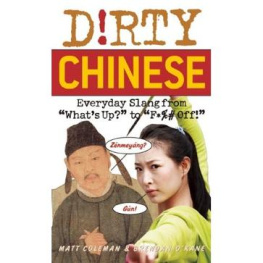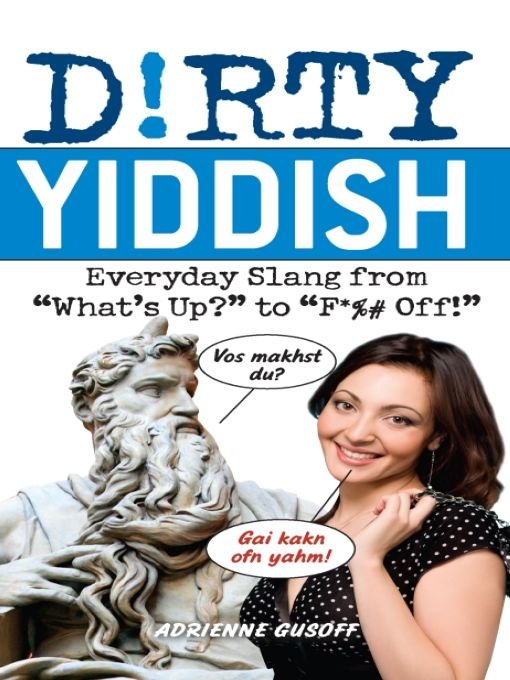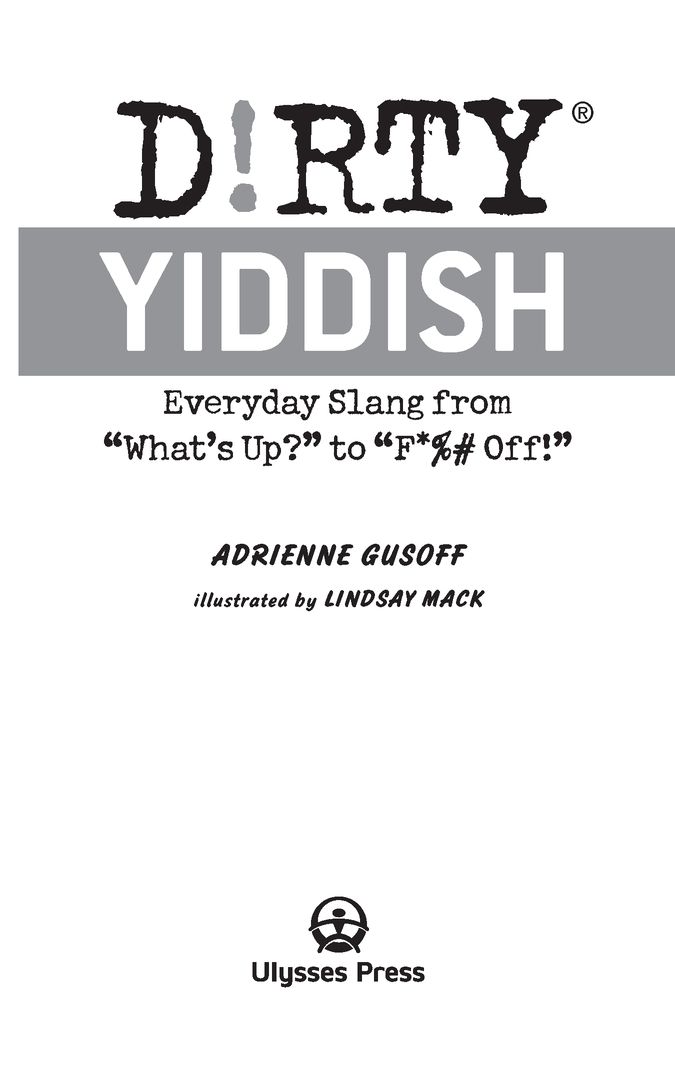Table of Contents
This book is for Mikie.
You are the wind beneath my Hadassah arms.
Acknowledgments
I would like to thank Alice Riegert, my editor, who was so helpful, supportive, understanding, and flexible. This book doesnt exactly fit into the format of the others in the series, and Alice always understood the unique voice this book needed to have. Huge thanks and much gratitude to Kelly Reed, who found me via my website, liked what she saw, and offered me the wonderful opportunity to write this book. A sheynem dank to a Lubavitcher rebbe who shall go unnamed (at his request) to protect his reputation, but who was very helpful, and such a great sport!
A grateful shout-out to various people at the Workmans Circle, Folksbiene Yiddish Theatre, the YIVO Institute, and various Yiddish speakers who helped me here and there with a word or phrase. Thank you, Bella Rabinowitz, for your help and stories. Thanks to my mother-in-law, Edith Berkowitz, and my aunt-in-law, Mildred Litowitz, for their help, suggestions, and encouragement. I am grateful, too, to all the other cataloguers of the mama loshenUriel Weinreich, Leo Rosten, Fred Kogos, Michael Wexwho share(d) their joy and understanding of Yiddish with the rest of us. Much gratitude to the invaluable websites yiddishdictionaryonline.com and kehillatisrael.net. (For consistency, the former is used for spellings that also account for regional variations in pronunciation.)
Thanks to all my friends, Jane Furst, Wendy Brackman, Judy Witmer, Jan Albert, Bethany Kandell, Dave Wilborn and Jessica Prince, Steve Ference, Gabrielle Euvino, Joey Perillo, Lino Apone (Shh! He thinks Im teaching him English!) and many others, who listened, read, laughed, helped in various ways, and offered up their own suggestions.
Thanks to my grandparents and parents, who instilled in me the love and appreciation for Yiddish.
And of course, to my bashert, Mikie, the menschiest mensch in the whole wide velt!
USING THIS BOOK
So, nu? You want to learn, maybe, a little Yiddish? Drop a few well-chosen Y-bombs into your everyday conversation? Brush up on the language you heard as a child? Learn a secret lingo to speak with your friends? Help bring the mama loshen (mother tongue) back from the edge of extinction? Impress your Jewish friends and associates?
Yiddish is a wonderfully rich, descriptive, onomatopoeic language full of colorful words and expressions. But Yiddish is more than just language. Its a window into the Jewish mind-set. Its a way of thinking, of seeing and categorizing the world. Yiddish knocks the high and mighty off their pedestals. It questions authority. It argues. It keenly observes the subtle nuances of human behavior. Its philosophical about life. And, of course, its sarcastic as hell.
Heres a snippet of history for you: Before World War II, Yiddish was spoken by more than 11 million religious and secular Jews throughout Germany, Poland, and Eastern Europe. Today, its rare to find an assimilated American Jew under the age of 80 who speaks fluently. (Fluent speakers are pretty much limited to the Hasidic and Orthodox Jewish communities; thus its pretty unlikely youre going to be using this book to hit on someone who only speaks Yiddish.)
Up until the 1960s, Yiddish was often spoken in assimilated Jewish homes by the older generation as a secret language when they didnt want the kids to understand what they were saying. As the alteh kackers (old farts) passed away, Yiddish all but disappeared as a first language. Still, many baby boomers managed to pick up quite a lot. Through them, these words have worked their way into English through TV, film, magazines, newspapers, and more, until Yiddish became part of Americas pop culture.
Though subsequent generations may lack the broad vocabulary of our ancestors, certain things just feel more correct when expressed in Yiddish: Mazel tov! (Congrats!) The gantzeh megillah (long, drawn-out story) or Oy gevalt! (Holy shit!).
On the other hand, since Yiddish is no longer a living street language, without the benefit of pop media to create and spread new expressions, its somewhat stuck in the early 20th century. Yiddish, while a very expressive language in so many ways, has relatively little raunchy slang. If you want to express naughty or perverse thoughts or actions, or if you want the equivalent of smoke a dooby; you need to get very creative.
Toward that end, Ive cobbled together some expressions incorporating existing kosher Yiddish words or slang to fill the void. These are indicated by (*).
So no matter what you are using this book forwhether its to impress your Jewish coworkers or get in touch with your rootsget dirty with it!
PRONUNCIATION
Yiddish is written with Hebrew letters, and read right to left, but for the purposes of this book, all words have been transliterated, i.e., spelled in English as they sound. As they sound, however, is a matter of opinion. And you know what they say, Three Jews, four opinions. Thats why youve got your FinkleSTINEs and FinkleSTEENs.
Since Yiddish was spoken widely by Jews, or Yidden, all over Europefrom Warsaw to Minsk, from Budapest to Vilnaaccents and inflections varied greatly, This leads to significant variation in the English spellings. For example, ferdraydt is the same as fardrayed and verdrayt, etc. Proper spelling in Yiddish characters, however, remains consistent (as spelling does in English.) For example, in English, the word aunt is always spelled the same, but pronunciation varies greatly from New York to Texas, from London to Jamaica.
Ive transcribed words as I learned them, mainly from my Polish-accented family. Those of, say, Lithuanian or Hungarian backgrounds may have learned these words differently. (Gib a kik vs. gib a kuk, both of which mean give a look.) Its an issue of, I say to-MAY-to, you say to-MAH-to. Who cares, as long as theres a bagel with a shmear underneath the slice!
In some words, where a slight change of spelling/pronunciation gives the word an entirely different meaninge.g., kapporeh (penance) vs. kapoyre (backward)this distinction has been noted and emphasized.
Most scholarly works assign one Roman letter or letter combo for each Yiddish letter or diphthong, and use them consistently. Unless youre a walking dictionary, you probably arent too familiar with this key to pronunciation. For example, the word for grandmother is spelled, in Yiddish:




four letters whose English equivalents are: BOBE (although the o is somewhere between a short o and a short u). In many dictionaries, its transliterated as bobe or even bobbe. English speakers would probably pronounce that as bowb or bobso wrong! The word has two syllables, with the last e being short. Thus, bubbeh, or even bobbeh, is more likely to produce the correct pronunciation. By adding the h at the end, its more obvious that the word has two syllables and that the e is short. (The final e is always pronounced and always short.)








